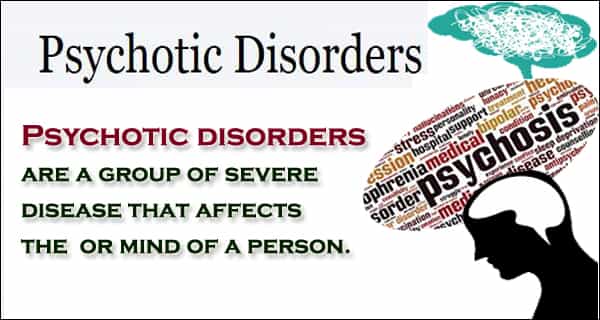deal with Psychotic Disorder: Psychotic disorders are a group of severe disease that affects the or mind of a person. These are severe mental disorders that cause abnormal thinking and perceptions. Patient loss touch with actuality. They make hard for someone to think evidently, proper decision, understand reality, speak effectively and act properly. stress and mental health
Psychotic disorders
deal with Psychotic Disorder, In case symptoms are severe, people with psychotic disorders feel difficulty remaining in touch with reality and are often and unable to push up daily life. However, it can be treated successfully.
7 types of psychotic disorders
1. Schizophrenia
This type of illness changes behavior and other symptoms, such as delusions and hallucinations- which remain continued longer than 6 months or more. It affects them at office work or school, relationship.
2. Schizophreniform disorder
It includes the symptoms of schizophrenia which remain for a shorter time and lasts within 1 to 6 months.
3. Brief psychotic disorder
This type of illness has sudden and short-time psychotic behavior. It is due to very stress full events, such as a death in the family. The patient recovers quickly in a short period.
4. Delusional disorder
In this disorder, the patient feels a false, fixed belief involving a real-life situation that could be true but really that is not true. It lasts within one month.
5. Substance-induced psychotic disorder
It is due to the use or withdrawal of drugs, such as hallucinogens and cracks cocaine, which causes hallucinations, delusions, or perplexed talking.
6. Psychotic disorder due to other medical condition
Psychotic disorder due to other medical conditions hallucinations, delusions, and other symptoms occur due to change in the medical condition such as brain tumors or head injury.
7. Paraphrenia
This type of illness change in behavior and other symptoms, such as delusions and hallucinations-it starts in senior citizen/elder age people late in life.
Symptoms of psychotic disorders
- The main symptoms are such as delusions and hallucinations, change in behavior, and other symptoms.
- In Hallucinations patients see, hear or feel such things that do not exist. For instance, patients see things that are not present there. The patient hears different types of voice, smells, or a funny taste in his mouth and some times feel that anybody is touching him whereas there is nobody touching his body.
- Delusions: It is false beliefs that do not go away even then same has been shown to be false, for instance, the patient feels that the food presented to him is poisoned, he does not accept the food even though anybody proved that it is fine.
- All patients do not have similar symptoms. However, some other symptoms are as under,
- confused speech.
- puzzled thinking.
- Dangerous behavior and anxiety.
- Slow movement.
- Do not maintain personal hygiene.
- Do not take interest in social activity.
- Unable to maintain proper relationships in school or at the workplace.
- Mood swing.
- Depressed mood.
Causes of psychotic disorders
deal with Psychotic Disorder, The causes of psychotic disorders are not known. Research carried out in the field reveals that some disorders are run in families, which means that the disorder is partly inherited. Other causes include stress, drug abuse, and change in life.
In certain psychotic disorders such as schizophrenia, there may be problems in parts of the brain which control thinking, perception and motivation. Experts believe that nerve cell receptor that works with a brain chemical called glutamate may not work properly in specific brain regions. Those glitches give problems with thinking and perception.
These conditions generally first come out in the late teenage I.e. 20s or 30s in men and women equally.
Diagnosis
To diagnose this disorder after taking medical and psychiatric history, physical examination. Proper blood tests, brain imaging such as MRI scans, CT scans, EEGs to rule out physical illnesses as well as mental illnesses.
In case of doctor does not find the physical reason for illness, he refers the case to the psychiatrist or psychologist. These mental health professionals will take special interviews and assessment tools and decide whether the person is suffering from psychotic order or not.
Treatment of deal with Psychotic Disorder
Mostly psychotic disorders are treated with combination therapy of medication and psychotherapy or counseling under the supervision of specialists in the respective field. In most severe cases where the patient is dangerous to himself or other people, hospitalization is necessary.
In addition to the above regular morning walk, regular exercise, social activity, proper food intake such as the use of green vegetables, makes the patient return to normal life gradually.
Frequently Asked Question About deal with Psychotic Disorder
Q. How many types of Psychotic disorders?
Ans. Psychotic disorders are of many types, such as,
1.Schizophrenic.
2. Paraphrenia.
3.Schizophreniform disorder.
4. Brief psychotic disorder.
5. Delusional Disorder.
6. Substance-induced Psychotic disorder.
7.Psychotic disorder due to medical condition.
Q. What are the causes of Psychotic disorder?
Ans. Psychosis is a symptom, not an illness. It is triggered by a mental illness, physical injury, substance abuse, or extreme stress, or trauma.
Q. What is psychotic behavior?
Ans. Psychosis is a condition in which people lose some contact with reality. These people see and hear such things that other people cannot see or hear(Hallucinations) and believing things that are not actually true (delusions).
